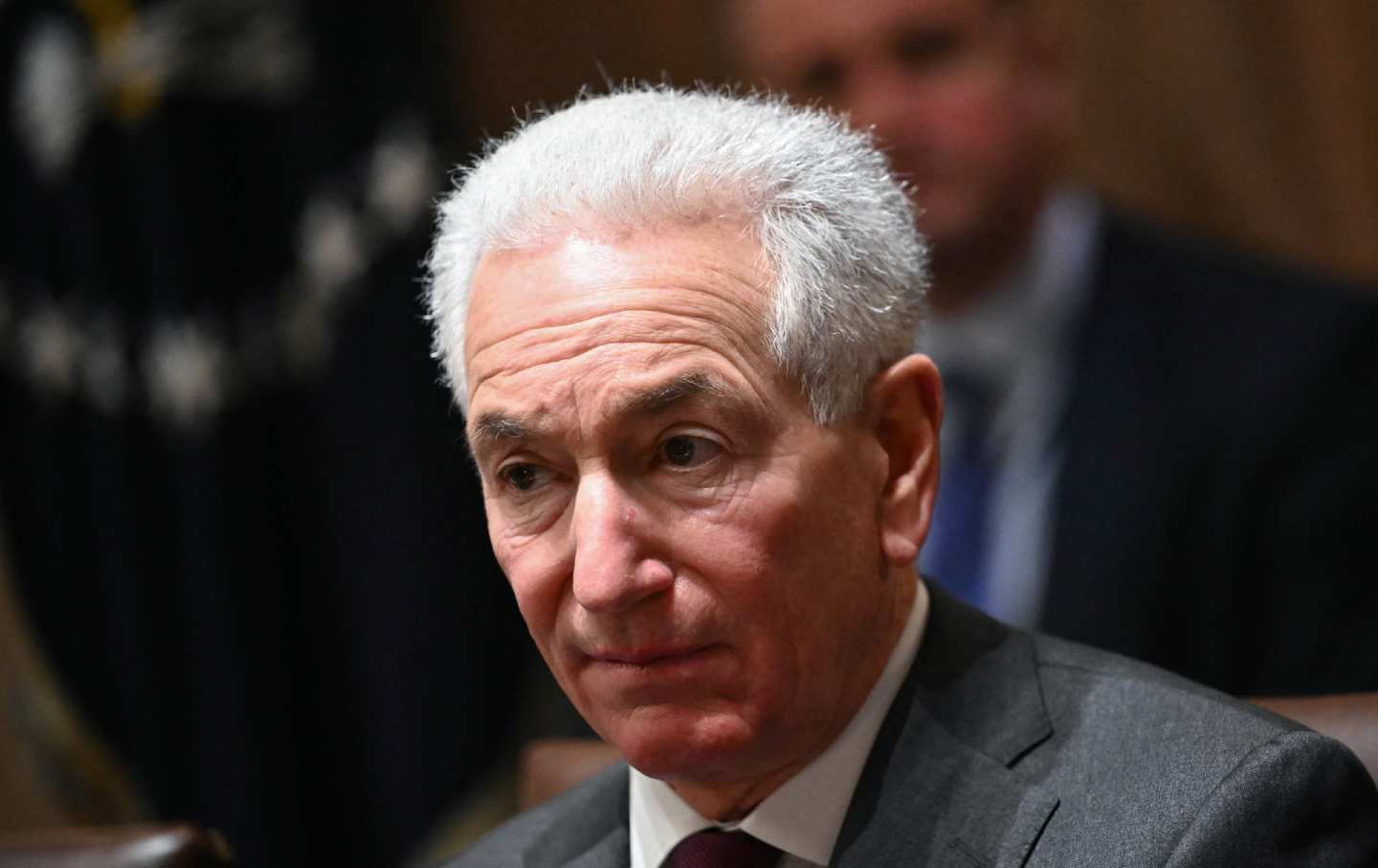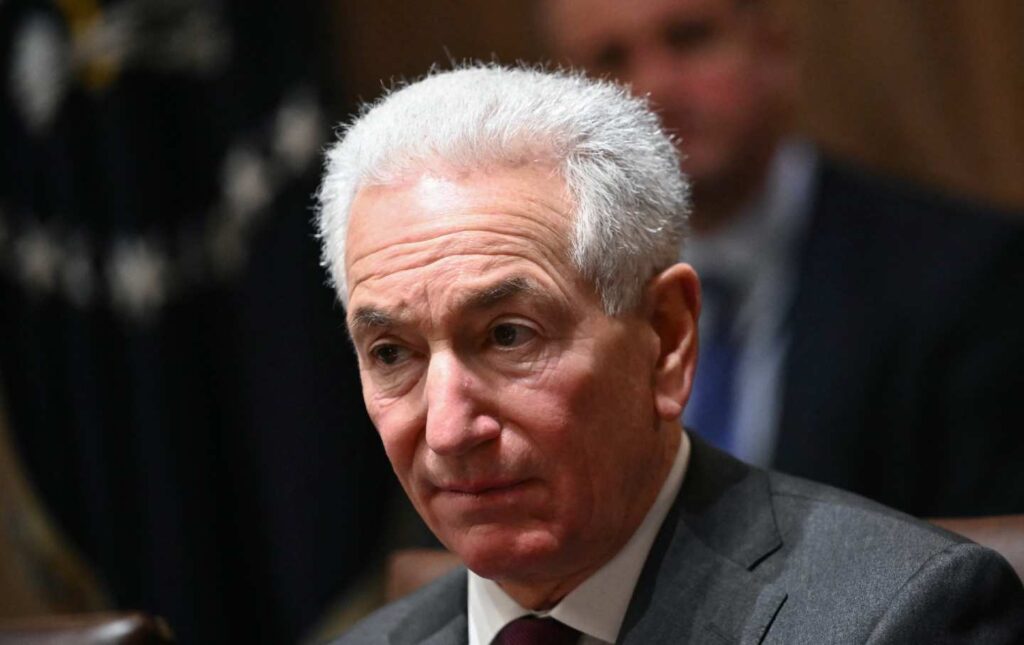Charlie Kushner, the newly confirmed US ambassador to France, is a vindictive, felonious, and score-settling real estate mogul, not unlike a certain US president.

Charles Kushner looks on at a White House meeting of US ambasadors
(Mandel Ngan / AFP via Getty Images)
The first time I met Charlie Kushner was at the Kushner Company offices at 666 Fifth Avenue, the New York City skyscraper the company bought in 2007 for $1.8 billion, making it the largest commercial real estate deal in history. I had just been hired by Charlie’s son Jared to be the editor in chief of The New York Observer, a small but prestigious newspaper the Kushners had acquired in 2006 from the paper’s founder, Arthur Carter.
Jared introduced us, and I reached out to shake Charlie’s hand. He ignored it, seemingly irritated by my arrival. “I didn’t know we were hiring you,” he said, and that was the end of the conversation. I was taken aback by it, because he had no reason to be openly hostile to me—and I would later learn that Charlie’s being out of the loop of any company decision would have been an aberration. Jared was nominally the face of the family real estate empire, but Charlie was usually there in the background, calling the shots. According to Vicky Ward’s reporting in her book Kushner Inc., when the terms of a deal forbade Charlie’s involvement, due to his incarceration, Jared would put him on speakerphone with partners and Charlie would pretend to be the company’s lawyer. Many people who worked with them viewed Jared as the favorite son whose job it was to rebuild the family’s reputation after Charlie was convicted of felony tax fraud in a seamy tabloid saga of family revenge. Charlie had hired a sex worker to seduce his brother-in-law and sent a video of it to his sister as revenge for agreeing to cooperate with the prosecution. President Donald Trump eventually pardoned him for these crimes, for one obvious reason: Charlie’s son is married to Ivanka Trump.
Current Issue

This week, the Senate confirmed Charlie Kushner as Donald Trump’s ambassador to France. Cory Booker of New Jersey supplied the sole Democratic vote for his confirmation. The vote might have taken some aback, given Booker’s recent public acts of resistance against the administration, but it operated on the same broad principle of elite conviviality that Trump’s pardon did: for many years, Charlie was a powerful figure in Democratic donor circles. He was close to former Governor Jim McGreevy, who nominated him to head the Port Authority. He hosted fundraisers for Booker early in his career, and Booker wrote a letter in his defense when he was indicted by then federal prosecutor Chris Christie.
Booker insists his vote to confirm Kushner was in recognition of Kushner’s support for criminal justice reforms for non violent offenders–a cause Charlie had newfound sympathy for after spending two years incarcerated in an Alabama prison on a military base. But it’s far more likely that Charlie Kushner still carries a great deal of clout as a political donor, and his protection by Trump means that Booker is hesitant—maybe even afraid—to alienate or anger him. Both Jared and Charlie are vindictive and hold grudges, often about perceived acts of disloyalty rather than any kind of actual slight or betrayal. When I was at the Observer, Jared was always indignant when journalists (including me) would refuse to let him use the publication to go after his enemies. Like many wealthy people who buy media publications for vanity reasons, he viewed journalists as glorified copywriters who were obligated to produce stories that advanced the family interests and went after people he wanted to settle scores with.
Jared’s sense of entitlement did not develop in a vacuum. I later learned from Ward’s book that, despite my unfailing politeness to Charlie, he routinely called me a “fucking bitch” behind my back. While I don’t love that characterization, I couldn’t help but notice that none of the employees I met at Kushner Companies were women except for a few assistants. (I imagine he thought that many women who’d been respectful to him but not deferential enough were fucking bitches.) Ward’s book also reports that Tuesday meetings at Kushner Co were described by employees as the “Tuesday beatings.” Charlie reportedly used the gatherings to berate employees for things that he perceived as betrayals, including his underlings’ refusal to follow questionable accounting procedures or “lose” inconvenient documents. He would also, according to Ward, fly into rages over mundane signs of what he took to be antisemitism even though everyone at the firm except some of the administrative staff was Jewish—from using a Montblanc pen (made in Germany) to driving a Lincoln Continental (manufactured by Henry Ford’s company).
Charlie had groomed Jared to take over the company, and his siblings were never seriously considered for the role. As a result, he kept Jared particularly close, buying his way into Harvard, acquiring apartments in Boston for him to run that were secretly stewarded by another Kushner Co employee, and assigning minders to chaperone him at different checkpoints in his career. The purchase of the Observer was clearly another effort to heighten the Kushners’ damaged reputation, with Jared acting as his dad’s strategically placed caretaker. So when Donald Trump got elected and Jared beelined to Washington in search of access to rooms he’d never otherwise be invited to enter, Charlie likely saw this as a pivotal opportunity to realize a return on his investment. At long last, Jared could bring his felon father back into the centers of power.
This week’s confirmation hearing shows how well this strategy has worked. Ambassadorships have always been spoils for money and loyalty to the sitting administration; as a result, few elected officials on either side of the aisle have made serious efforts to address the corrupt nature of many ambassadorial appointments. But even by those standards, some ambassadorships are worth more than others–both in terms of what they can accomplish and how prestigious they are. Ambassadors are the highest ranking diplomats in the US government, and ambassadorships with powerful allies and trading partners are particularly valued.
But what gets accomplished is often a matter of whether the diplomat in question is capable of, well, diplomacy. The record in Charlie Kushner’s case is hardly encouraging. He has run his career on the same playbook that Trump uses: Everything is a zero-sum game where one party wins and the other loses. Gains are made by threats and aggressive displays of power. Yes-men thrive under their tutelage and reasonable dissent is viewed as insubordination. These are fairly standard modes of thinking in the world of commercial real estate, but are wildly simplistic and counterproductive in the realm of international relations. In negotiations between countries, petulant demands from one side don’t provoke fear; rather, they increase derision and distrust, which leads in turn to serious damage to the relationship.
In Kushner’s confirmation hearing, he said that he understood that he had made some “very serious” mistakes and insisted that he had paid a price for them and was wiser now. If that’s true, it’s a recent development. Jared always insisted that his father had done nothing wrong and had been railroaded by Chris Christie and the New Jersey media. But not everyone in the family viewed it that way.
Jared’s younger brother, Josh, is a successful venture capitalist with a sense of curiosity and self-awareness that I never saw in Jared, and I attribute this partly to the fact that they had very disparate relationships with Charlie. Both of them loved their father, but Charlie kept Jared on a tight leash and Josh took his own path. Unlike Jared, he didn’t seem to inherit his father’s rageful temperament; he was thoughtful and empathetic toward others. One morning over a breakfast meeting, Josh and I were discussing a recent profile of Jared and Ivanka that had appeared in the Sunday Styles section of The New York Times. The article was largely flattering, but it included a short bit about Charlie’s incarceration, which I knew would infuriate Jared—even though the detail that he flew down to Montgomery, Alabama, every weekend to visit his dad as a teenager was sympathetic and made Jared seem like a innocent collateral casualty of his father’s misdeeds.
I told Josh I was sorry that their dad’s incarceration would always be a part of their biographies and mentioned that my late younger brother had been incarcerated off and on in the decade before he died, and it was devastating for my family. My brother was a veteran with some mental health issues that were never sufficiently addressed, and, coincidentally, he had gone to the same military base in Montgomery where Charlie had been incarcerated for mental health treatment. “I’m sorry for your parents,” Josh said. “Your brother was mentally ill and it wasn’t their fault.” But he continued, “In some ways, I think much of our family’s pain is self-inflicted.”
Popular
“swipe left below to view more authors”Swipe →
It’s unclear whether Charlie Kushner himself has come to that realization, or whether he will simply use the post to generate business opportunities and settle scores, wielding unearned power to put his enemies—real and perceived—in their place. Diplomacy is an exercise in developing and deploying soft power, negotiating strategic compromises and sometimes acknowledging and working to repair mistakes. Despite Cory Booker’s insistence that Kushner has been instrumental in helping to bring about bipartisan criminal justice reform, it’s hard for me to see how a new Charlie Kushner emerged from the crucible of his prison sentence; the gladiatorial pursuit of self-interest in profit is as strong in him as it is in his Oval Office benefactor. If Charlie Kushner cannot develop the necessary skills to advance US interests in a productive way, and won’t refrain from relying on his usual arsenal of threats and coercion, he will simply exacerbate the damage Trump has already done.
And it will not be the fault of France or the European Union. It will be the product of the corruption and venality that led to Kushner’s appointment in the first place. Our pain will be entirely self-inflicted.
Elizabeth Spiers
Elizabeth Spiers is a digital media strategist and writer living in Brooklyn. She is the former editor in chief of The New York Observer.

